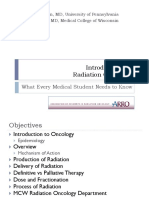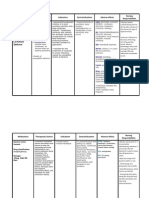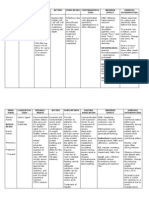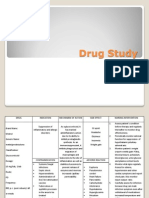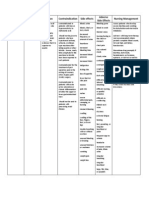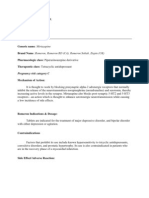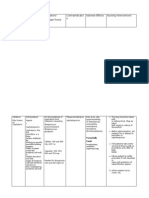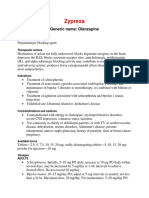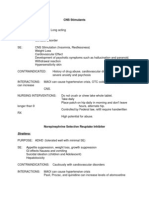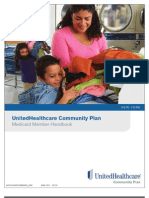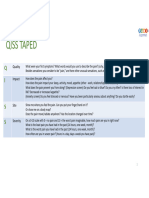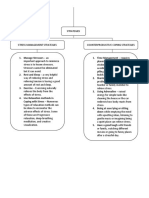Drug Study FORT
Drug Study FORT
Uploaded by
Lysa Mae EleazarCopyright:
Available Formats
Drug Study FORT
Drug Study FORT
Uploaded by
Lysa Mae EleazarCopyright
Available Formats
Share this document
Did you find this document useful?
Is this content inappropriate?
Copyright:
Available Formats
Drug Study FORT
Drug Study FORT
Uploaded by
Lysa Mae EleazarCopyright:
Available Formats
Eleazar, Elysa Mae S. 302N/Grp.
Aug. 8, 2011 Ms. L. Soriano R.N., M.A.N
Drug Study
Name of Drug
Generic Name: Citicholine Sodium Brand Name: Zynapse, Somazine, Cholinerve Drug Class: CNS Stimulant, Peripheral Vasodilators, Cerebr alActivators, Neurotropics Dosage: 40mg/tab OD Route: Oral
Indication & Contraindication
Indications: Citicholine is indicated in CVD in acute recovery phase in severe s/sx of cerebrovascular insufficiency and incranial traumatism and their sequellae. Citicholin e in CVA, stimulates brain function. Contraindications: Any allergy or hypersensitivity to the drug Hypertonia of the parasympathetic nervous system Use cautiously for pregnancy and lactation Conscious use for patient with renal and hepatic damage
Mechanism of Action
Citicholine increases blood flow and O2 consumption in the brain. It is also involved in the biosysntehsis action.
Adverse Effect
Fleeting and discrete hypotension effect, increased parasympathetic affects, low blood pressure Itching or hives, swelling in face or hands, chest tightness, tingling in mouth and throat
Nursing Responsibilities
Take Citicholine as prescribed Take Citicholine on time Monitor patients neurologic status Note if there are signs of slurring of speech Note for adverse reactions Titter medication when discontinuing Teach patient on how to take the drug
Arrange for regular
follow-ups
Eleazar, Elysa Mae S.
Aug. 8, 2011
302N/Grp.1
Ms. L. Soriano R.N., M.A.N
Drug Study
Name of Drug
Generic Name: Chlorpheniramine Maleate Brand Name: Atarax, ChlorTrimeton, Dimetane, Dimetapp, Dramamine, Optimine, Periactin, Polaramine, PBZ, Vistaril Drug Class: Antihistamines
Indication & Contraindication
Indications: Temporary relief of sneezing, itchy, watery eyes, itchy nose or throat, and runny nose caused by hay fever (allergic rhinitis), or other respiratory allergies. Contraindications: Hypersensitivity to antihistamines; narrow-angle glaucoma; stenosing peptic ulcer; symptomatic prostatic hypertrophy; asthmatic attack; bladder neck obstruction; pyloroduodenal obstruction; MAO therapy; use in newborn or premature infants and in breastfeeding mothers.
Mechanism of Action
Completely blocks the effects of histamine at H1receptor sites; has atropine-like, antipruritic, & sedative effects.
Adverse Effect
Cardiovascular: Bradycardia; extrasystoles; orthostatic hypotension; palpitations; reflex tachycardia; tachycardia. CNS: Confusion; convulsions; disturbed coordination; dizziness; drowsiness; euphoria; excitation; faintness; fatigue; headache; hysteria; insomnia; irritability; nervousness; neuritis; paresthesias; restlessness; sedation; tremor; vertigo. EENT: Acute labyrinthitis; blurred vision; diplopia; dry nose and throat; nasal stuffiness; sore throat; tinnitus. GI: Anorexia; constipation; diarrhea; dry mouth; epigastric distress; nausea; vomiting. Genitourinary: Difficult urination; dysuria; early menses; urinary frequency or retention.
Nursing Responsibilities
Caution patient using
OTC chlorpheniramine that each product has specific dosing instructions and to read package label before using and not to exceed dose or frequency of administration instructions. Advise patient to take each dose without regard to meals, but to take with food if stomach upset occurs. Advise patient or caregiver using oral syrup to measure and administer prescribed dose using dosing syringe, dosing spoon, or dosing cup. Advise patient that if a dose is missed, to take it as soon as possible unless it is nearing time for the next scheduled dose. If it is nearing time for next scheduled dose, advise patient to skip the missed dose and take the next dose at the regularly scheduled time. Caution patient not to double the dose to catch up. Advise patient that if allergy symptoms are not controlled, not to increase the dose of medication or frequency of use but to inform health care provider. Caution patient that larger doses or more frequent dosing does not increase efficacy and may cause excessive drowsiness or other adverse reactions.
Dosage: 40mg/tab OD Route: Oral
Eleazar, Elysa Mae S.
Aug. 8, 2011
302N/Grp.1
Ms. L. Soriano R.N., M.A.N
Drug Study
Name of Drug
Generic Name: Atorvastatin Calcium Brand Name: Lipitor Drug Class: Antihyperlipidemic, HMG-CoA Reductase inhibitor Dose: 40mg/tab OD Route: Oral
Indication & Contraindication
Indication: Adjunct to diet in treatment of elevated total cholesterol, serum triglycerides, & LDL cholesterol & to increase HDL-C in patients with primary hypercholesterolemia & mixed dyslipidemia & primary dysbetalipoproteinem ia, whose response to dietary restriction of saturated fat & cholesterol & other nonpharmacologic measures has not been adequate. Adjunct to diet treat elevated serum triglyceride levels. Contraindication: Allergy to atorvastatin, fungal byproducts, active hepatic disease, or unexplained & persistent elevations of transaminase levels, pregnancy, lactation.
Mechanism of Action
Inhibits HMG-CoA reductase, the enzyme that catalyzes the first step in the cholesterol synthesis pathway, resulting in a decrease in serum cholesterol, serum LDLs & increases serum HDLs; increases hepatic LDL recapture sites, enhances reuptake & catabolism of LDL; lowers triglyceride levels.
Adverse Effect
Nursing Responsibilities
CNS: Headache, Tell patient to take asthenia drug at the same GI: Flatulence, time abdominal pain, each day to cramps, maintain its effects. constipation, nausea, dyspepsia, Instruct patient to heartburn, liver take a missed dose failure as Respiratory: soon as possible. If Sinusitis, pharyngitis its almost time for Other: his next dose, he Rhabdomyolysis should skip the with acute renal missed dose. failure, arthralgia, myalgia Instruct patient to consult prescriber before taking OTC niacin because of increased risk of rhabdomyolysis. Advise patient to notify prescriber immediately if he develops unexplained muscle pain, tenderness, or weakness, especially if accompanied by fatigue or fever.
You might also like
- Wilhelm Reich - How To Dissolve Energy Blocks of Human BodyDocument113 pagesWilhelm Reich - How To Dissolve Energy Blocks of Human Bodyfranco100% (12)
- Healing Processes in Group Dance TherapyDocument20 pagesHealing Processes in Group Dance Therapygabriela_nnitulescu100% (1)
- Clinical Medication ListDocument181 pagesClinical Medication Listsophia onu100% (2)
- Drug Study TramadolDocument14 pagesDrug Study TramadolBianca Freya Porral85% (13)
- Naplex Complete Study Outline A Topic-Wise Approach DiabetesFrom EverandNaplex Complete Study Outline A Topic-Wise Approach DiabetesRating: 4 out of 5 stars4/5 (3)
- Introduction To Radiation Oncology: What Every Medical Student Needs To KnowDocument49 pagesIntroduction To Radiation Oncology: What Every Medical Student Needs To KnowSeni KNo ratings yet
- Heart Failure - Nursing ManagementDocument9 pagesHeart Failure - Nursing ManagementAuni Akif Aleesa100% (2)
- Avulsion of Primary Tooth-Modifi Ed Essix Retainer As A Space MaintainerDocument2 pagesAvulsion of Primary Tooth-Modifi Ed Essix Retainer As A Space Maintainernecrosis pulpNo ratings yet
- Drug Analysis (RN) - 3Document9 pagesDrug Analysis (RN) - 3Joannalyn Libo-on0% (1)
- Name of Drug/ Therapeutic Class Action Indications Side Effect Nursing Considerations ParacetamolDocument7 pagesName of Drug/ Therapeutic Class Action Indications Side Effect Nursing Considerations ParacetamolAnne Monique Moran OngjocoNo ratings yet
- CVA Drug StudyDocument51 pagesCVA Drug StudyKarel LuNo ratings yet
- Drug Table 3 Due 3-28Document5 pagesDrug Table 3 Due 3-28jvanessam703No ratings yet
- Drugstudy and SoapieDocument17 pagesDrugstudy and SoapieYasi EcheniqueNo ratings yet
- All Kinds of DrugsDocument11 pagesAll Kinds of DrugsRene John Francisco100% (1)
- Therapeutic: Urinary Tract Stimulants Pharmacologic: CholinergicDocument37 pagesTherapeutic: Urinary Tract Stimulants Pharmacologic: CholinergicApple MaeNo ratings yet
- Drug StudyDocument5 pagesDrug StudyBea Andrea LarismaNo ratings yet
- Drug Study Case Study PebsDocument6 pagesDrug Study Case Study PebsMichael John Gambong SalaNo ratings yet
- Drug Name Dose, Route, Frequency Mechanism of Drug Indications Adverse Effects Contraindications Nursing ResponsibilitiesDocument15 pagesDrug Name Dose, Route, Frequency Mechanism of Drug Indications Adverse Effects Contraindications Nursing ResponsibilitiesitsmechachaNo ratings yet
- Drug StudyDocument12 pagesDrug StudyQueenie Gail Duarte RodrigoNo ratings yet
- Drug StudyDocument17 pagesDrug StudyKenneth ManalangNo ratings yet
- MM MM MM MM MMM MMMMM M MM M MMMM MMMMM MMM MM MMM MM!M M!"M#MM MM M $M M %MMM MM "M "MM M MMM MDocument9 pagesMM MM MM MM MMM MMMMM M MM M MMMM MMMMM MMM MM MMM MM!M M!"M#MM MM M $M M %MMM MM "M "MM M MMM M배기숭No ratings yet
- Drug StudyDocument5 pagesDrug StudyRai D. MacapantonNo ratings yet
- Lisinopril PDFDocument3 pagesLisinopril PDFHannaNo ratings yet
- 1.) Generic Name: Gabapentin Brand Name Classification Dosage Route and Frequency Mechanism of ActionDocument15 pages1.) Generic Name: Gabapentin Brand Name Classification Dosage Route and Frequency Mechanism of ActionTyron ChuaNo ratings yet
- Drug StudyDocument3 pagesDrug Studyanon_11638632No ratings yet
- Generic Name and Brand Name Classification Action Dosage Indication Contraindication Adverse Reaction Nursing ResponsibilityDocument2 pagesGeneric Name and Brand Name Classification Action Dosage Indication Contraindication Adverse Reaction Nursing ResponsibilityRoseben SomidoNo ratings yet
- Case Pres PREECLAMPSIA Drugs NCPDocument12 pagesCase Pres PREECLAMPSIA Drugs NCPDanica May Galvez100% (1)
- Labs Drug Study 1Document17 pagesLabs Drug Study 1Drei LanuzoNo ratings yet
- NCP DrugDocument13 pagesNCP DrugMhar CamposanoNo ratings yet
- Pysch DruganaDocument3 pagesPysch DruganaladywentzNo ratings yet
- Pentazine, Phenazine, Phencen,, Phenoject-50, Prometh, Prorex, Prothazine, V-GanDocument34 pagesPentazine, Phenazine, Phencen,, Phenoject-50, Prometh, Prorex, Prothazine, V-GankotonashiNo ratings yet
- Complete Drugs StudyDocument13 pagesComplete Drugs StudyPeace Andong PerochoNo ratings yet
- Drug Study: Francisco Tampos JRDocument37 pagesDrug Study: Francisco Tampos JRCarlmeister Ambray JudillaNo ratings yet
- DRUG and IVF StudyDocument4 pagesDRUG and IVF StudyJohanna Camelle Insong MonteronNo ratings yet
- Drug Study HydralazineDocument10 pagesDrug Study HydralazineLuige AvilaNo ratings yet
- C C C Vertigo,: Electrolyte and Water Balance AgentDocument12 pagesC C C Vertigo,: Electrolyte and Water Balance AgentEarl Tony TrinidadNo ratings yet
- Drug StudyDocument4 pagesDrug StudyFrances Oscar GaviolaNo ratings yet
- Medication: Captopril (Capoten) Is An ACE Inhibitor and A Common Antihypertensive. Captopril Generic Name Contents (Hide)Document43 pagesMedication: Captopril (Capoten) Is An ACE Inhibitor and A Common Antihypertensive. Captopril Generic Name Contents (Hide)Kath Rubio0% (1)
- Drug StudyDocument22 pagesDrug StudyColleen Fretzie Laguardia NavarroNo ratings yet
- QuetiapineDocument3 pagesQuetiapineMichael KuzbytNo ratings yet
- Drug StudyDocument14 pagesDrug StudyKatrina EstoconingNo ratings yet
- Name of Drug Indications Action Contraindication Side Effects Adverse Side Effects Nursing ManagementDocument3 pagesName of Drug Indications Action Contraindication Side Effects Adverse Side Effects Nursing Managementjhappo31No ratings yet
- Drugs Study For PneumoniaDocument5 pagesDrugs Study For PneumoniaLucelle ArellanoNo ratings yet
- Common MedicationsDocument12 pagesCommon MedicationsJasmeen KaurNo ratings yet
- Drug Study (Lactulose, Zynapse, Simvastatin) and HTP - CVD Prob CardioembolismDocument9 pagesDrug Study (Lactulose, Zynapse, Simvastatin) and HTP - CVD Prob CardioembolismRene John FranciscoNo ratings yet
- Drug Study Drug Name Classifications Action Indication Adverse Effects Contraindication Nursing Responsibility CnsDocument4 pagesDrug Study Drug Name Classifications Action Indication Adverse Effects Contraindication Nursing Responsibility CnsMarielle SorianoNo ratings yet
- Fluvoxamine MaleateDocument3 pagesFluvoxamine MaleateHilman Fitriaji Suganda PrawiraNo ratings yet
- Drug 1Document5 pagesDrug 1Jesamine MayNo ratings yet
- LM, KLDocument5 pagesLM, KLVictor CondeNo ratings yet
- Drug StudyDocument9 pagesDrug StudyShane Arroyo100% (1)
- MirtazapineDocument4 pagesMirtazapineJEn ValentosNo ratings yet
- Atorvastatin & CiticolineDocument6 pagesAtorvastatin & CiticolineJames LafuenteNo ratings yet
- Drug Study - LeptospirosisDocument19 pagesDrug Study - LeptospirosisCamille PinedaNo ratings yet
- Drug StudyDocument19 pagesDrug StudyLovely EsguerraNo ratings yet
- Drug Name Classification and Mechanism of Action Indication/ Dosage/ Route Contraindicatio N Adverse Effects Nursing InterventionsDocument6 pagesDrug Name Classification and Mechanism of Action Indication/ Dosage/ Route Contraindicatio N Adverse Effects Nursing InterventionsVin LandichoNo ratings yet
- Drug StudyDocument9 pagesDrug StudyYrban GuyuranNo ratings yet
- Aminophylline (Theophylline Ethylenediamine) : TruphyllineDocument4 pagesAminophylline (Theophylline Ethylenediamine) : TruphyllineRosalie SepayaNo ratings yet
- CHN Drug StudyDocument10 pagesCHN Drug StudyJoshua Cyryll ComiaNo ratings yet
- FINAL Drug StudyDocument9 pagesFINAL Drug StudyKristen Leigh MarianoNo ratings yet
- Zyprexa: Generic Name: OlanzapineDocument3 pagesZyprexa: Generic Name: Olanzapinenasir khanNo ratings yet
- Top 100 Drugs Pocket Reference Guide (2023 Edition)From EverandTop 100 Drugs Pocket Reference Guide (2023 Edition)No ratings yet
- Critical Care Medications: Anti-Arrhythmics Study Guide: Critical Care EssentialsFrom EverandCritical Care Medications: Anti-Arrhythmics Study Guide: Critical Care EssentialsNo ratings yet
- Medical Encyclopedia XXL: Prof. J.P. Schadé, M.D., Ph.D. D.Sc.hcFrom EverandMedical Encyclopedia XXL: Prof. J.P. Schadé, M.D., Ph.D. D.Sc.hcNo ratings yet
- Simplifying Psychiatric Documentation: Time-Saving Templates for Medication RecommendationsFrom EverandSimplifying Psychiatric Documentation: Time-Saving Templates for Medication RecommendationsNo ratings yet
- Factitious DisorderDocument6 pagesFactitious DisorderRon JaredNo ratings yet
- Pharm 2 TestDocument7 pagesPharm 2 TestJaime HayesNo ratings yet
- Core QuestionnaireDocument12 pagesCore QuestionnaireAnonymous LsgfQuJf8No ratings yet
- Levels of Care For Addiction TreatmentDocument4 pagesLevels of Care For Addiction TreatmentChanNo ratings yet
- 2011 Member Handbook English UHCCPforAdults NYDocument52 pages2011 Member Handbook English UHCCPforAdults NYpatsan89No ratings yet
- Spinal Cord InjuryDocument37 pagesSpinal Cord InjuryArfian Deny PNo ratings yet
- Claudia MariaDocument8 pagesClaudia MarianurhayatiNo ratings yet
- Neuroanatomical Changes After Eye Movement Desensitization and Reprocessing (EMDR) Treatment in Posttraumatic Stress DisorderDocument2 pagesNeuroanatomical Changes After Eye Movement Desensitization and Reprocessing (EMDR) Treatment in Posttraumatic Stress DisorderClaudio PeñafielNo ratings yet
- Clinical Tips For The Management of Perimenopausal Syndrome by DR - Deepti ChawlaDocument19 pagesClinical Tips For The Management of Perimenopausal Syndrome by DR - Deepti ChawlaHomoeopathic PulseNo ratings yet
- Where Can I Buy EssaysDocument8 pagesWhere Can I Buy Essaysafibooxdjvvtdn100% (2)
- Goal ExplorationDocument4 pagesGoal ExplorationRonn AvilaNo ratings yet
- DVT ProphylaxisDocument30 pagesDVT ProphylaxissivaNo ratings yet
- Minor Ailments in PregnancyDocument14 pagesMinor Ailments in PregnancyGrace Maria Joy Kudilil100% (1)
- Finger On The Pulse.Document3 pagesFinger On The Pulse.Speech & Language Therapy in PracticeNo ratings yet
- Qiss TapedDocument2 pagesQiss TapedOzhenNo ratings yet
- Hammer Pulse TempDocument12 pagesHammer Pulse Temppeter911cm100% (2)
- Concept Map Chapter 6Document2 pagesConcept Map Chapter 6Jerico NunagNo ratings yet
- What Is Gestalt TherapyDocument5 pagesWhat Is Gestalt TherapyMelat Assegid100% (1)
- Healthy Quotes SelectedDocument4 pagesHealthy Quotes SelectedJay-Mar100% (1)
- Rebuilding The CommunityDocument2 pagesRebuilding The CommunityMohammed SameerNo ratings yet
- Resume 6-18-18Document2 pagesResume 6-18-18api-401933086No ratings yet
- General Principles of Periodontal SurgeryDocument10 pagesGeneral Principles of Periodontal SurgeryPurwana NasirNo ratings yet
- INSULINDocument6 pagesINSULINmilaNo ratings yet
- Bells Palsy 2 PDFDocument4 pagesBells Palsy 2 PDFAyuNo ratings yet
- Psych Reco MoviesDocument16 pagesPsych Reco MoviesJuanmiguel Ocampo Dion SchpNo ratings yet






